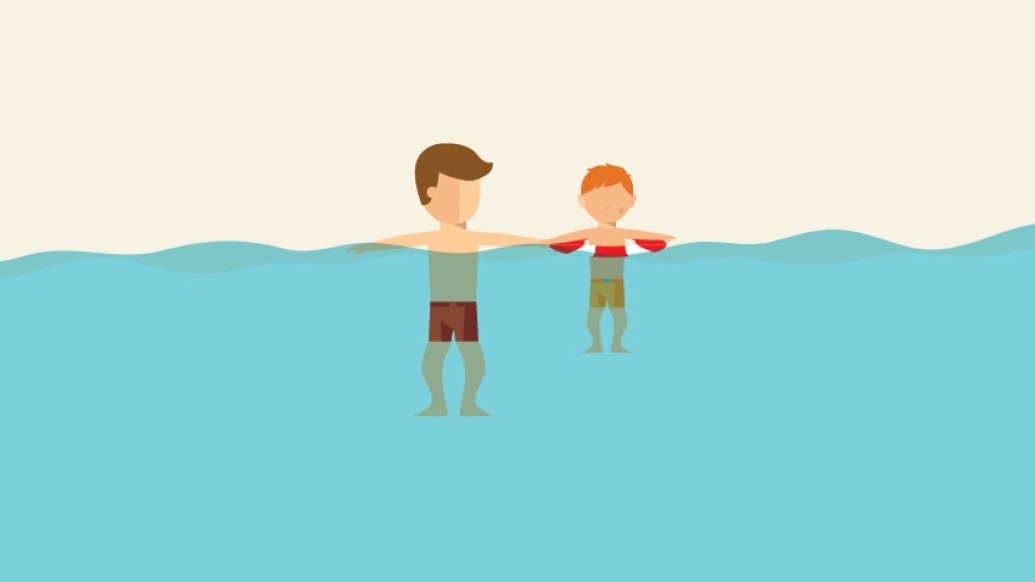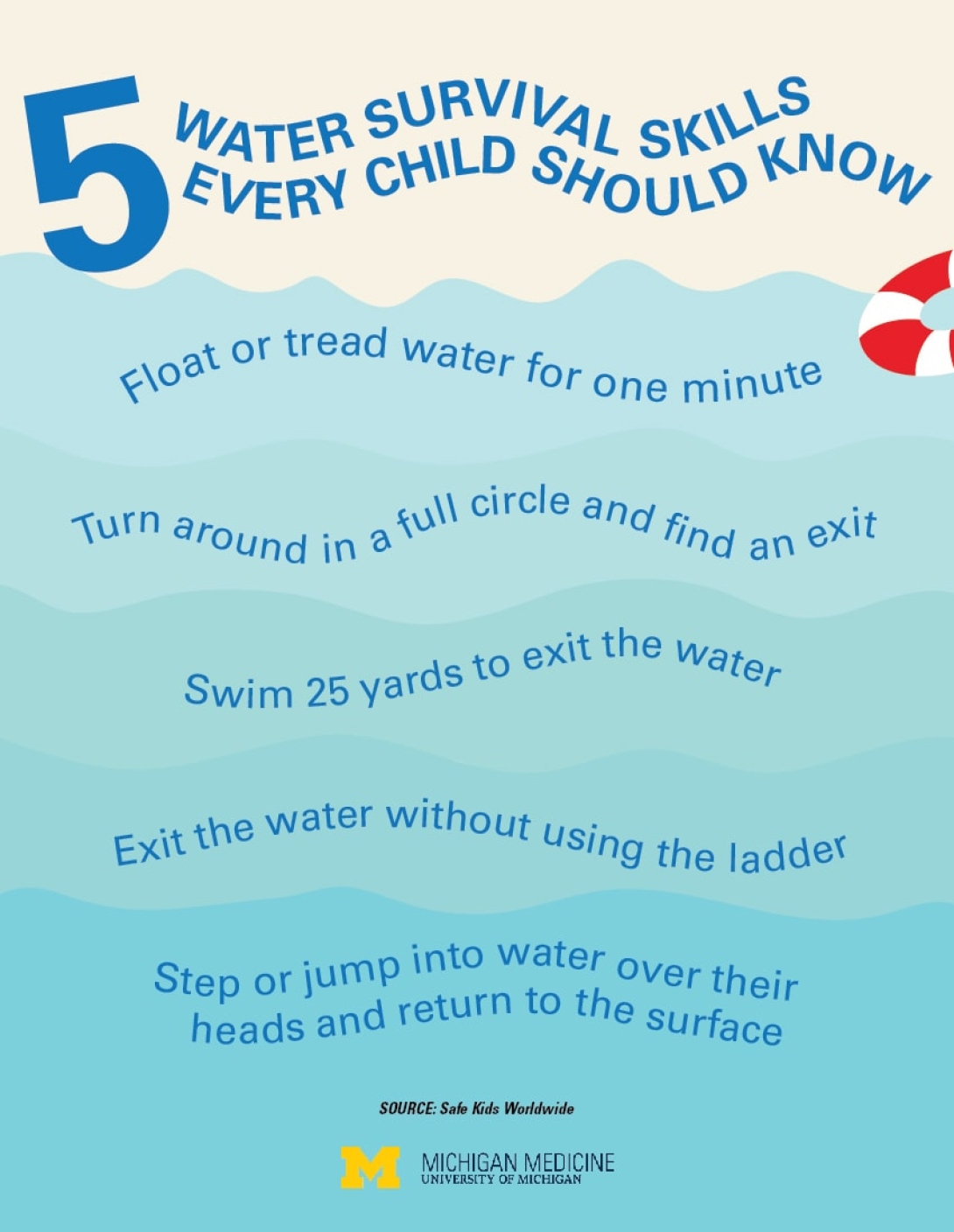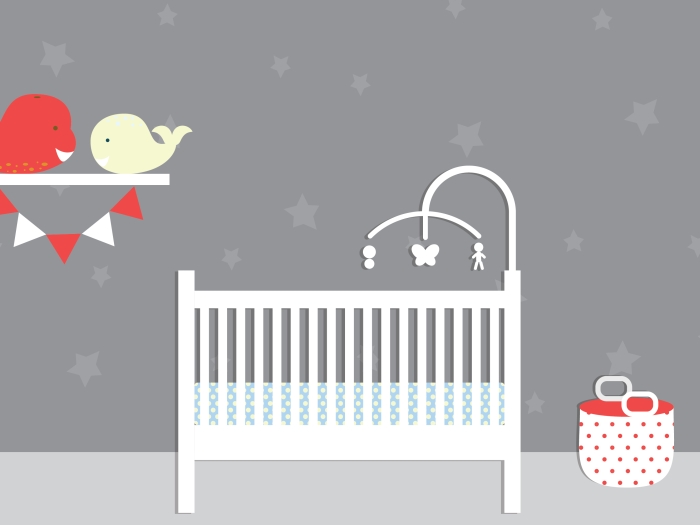In advance of summer swimming season, a Michigan Medicine educator says all parents should refresh their knowledge on water safety and caution.
7:00 AM
Author |

The return of warmer weather might mean thoughts of fun and leisure at the swimming pool.
It should also remind families to consider the risks that come with taking a dip.
MORE FROM MICHIGAN Sign up for our weekly newsletter
About 3,500 unintentional, non-boating-related drownings occur each year, according to the Centers for Disease Control and Prevention. One in 5 people who die from drowning are 14 years old or younger.
Nonfatal drowning injuries can lead to hospitalization and, in some cases, long-term disability.
That's why parents need to make sure kids are physically prepared and respectful of pool rules before diving in, says Bethany Folsom, a health educator for the Pediatric Trauma Injury Prevention program at University of Michigan C.S. Mott Children's Hospital.
"There are a lot of accidents that can happen," she says.
A new C.S. Mott Children's Hospital National Poll on Children's Health recently surveyed parents on several issues of water safety — including their interest in and access to swim lessons, as well as when and where a child might safely swim without supervision.
Although 97 percent of the 1,543 Mott Poll respondents said it is important for their kids to have basic swimming skills, far fewer actually have them. The nationally representative poll included parents of children ages 6 to 18.

The skill gap was further split by race: 55 percent of white parents say their children have taken swim lessons compared to 39 percent of Hispanic parents and 37 percent of black parents.
Poll respondents, regardless of ethnicity, cited cost, schedule conflicts and limited educational offerings in their area as barriers.
Across the board, slightly more than one-third of parents said they would allow their child to go into the water at a home or neighborhood pool without an adult present.
Those findings concern Folsom, a coordinator of Safe Kids Huron Valley, which is a local coalition of the national nonprofit Safe Kids Worldwide and aims to prevent unintentional injuries. And it should be reason, she says, for renewed dialogue about education and vigilance before pools open for the season.
"As a mom and a safety advocate, I say the more eyes on the water the better," says Folsom, who explained some crucial safety tips:
Water Safety Tips for Families
Take swim lessons: The American Academy of Pediatrics recommends children take swim lessons by age 4 (baby- and toddler-focused classes can help make kids comfortable in water, but do not supplant a need for more formal swimming lessons or adult supervision). Lessons, Folsom says, "teach a skill that can save one's life."
Foster respect for rules: Many accidents can be prevented by following basic pool rules such as using the buddy system, walking in the pool area and avoiding shallow areas when diving. Key, too, is responsibility. Says Folsom: "You don't hold your friends underneath the water. If someone can't swim, don't force them to go in deep water or areas they aren't comfortable."
SEE ALSO: 9 Essential Lawn Mower Safety Tips to Know Before You Mow
Always supervise kids: Lifeguards, though trained to spot horseplay or trouble, usually have dozens of swimmers to monitor. "The human eye can only catch so much," says Folsom. That's why a caregiver should always keep watch, too. One helpful tool: A "Water Watcher Card" parents or caretakers can pass around in shifts to signify a designated monitor.
Watch for silent drowning: Unlike what might be portrayed in movies, a drowning individual might not be splashing or crying out for help. "Drowning is actually very silent," says Folsom. Also, young people should be trained to seek out a life preserver, pole or rope to help someone when an adult isn't present; they should not go in themselves to help.
Hydrate and lather up: Time in the sun plus play can leave swimmers parched and risking dehydration. Have water or sports drinks handy for drink breaks. And while pools might be a good way to cool off, "The sun's rays bounce off the water and can cause even more damage to your skin," Folsom says. Apply sunscreen according to instructions.
Keep the pool area safe: Ensuring safety doesn't just apply when kids are in the water. Cover backyard pools to avoid issues during downtime. Says Folsom: "Make sure there is nothing enticing in the pool area." That means no inflatables or toys left in the vicinity. And all pools should be fenced and have a lockable gate.

Explore a variety of health care news & stories by visiting the Health Lab home page for more articles.

Department of Communication at Michigan Medicine
Want top health & research news weekly? Sign up for Health Lab’s newsletters today!





